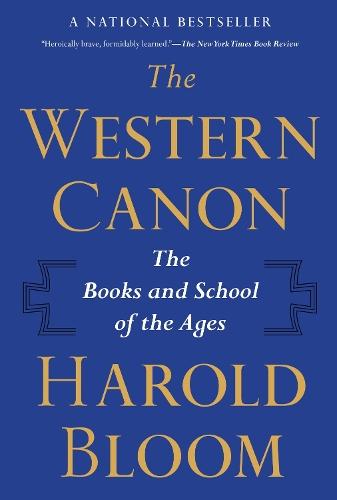Awards
- Winner of National Book Critics Circle Award Finalist (United States).
Overview
The literary critic defends the importance of Western literature from Chaucer and Shakespeare to Kafka and Beckett in this acclaimed national bestseller. “An impressive work...deeply, rightly passionate about the great books of the past.”—Michael Dirda, The Washington Post Book World Harold Bloom's The Western Canon is more than a required reading list—it is a “heroically brave, formidably learned” defense of the great works of literature that comprise the traditional Western Canon. Infused with a love of learning, compelling in its arguments for a unifying written culture, it argues brilliantly against the politicization of literature and presents a guide to the essential writers of the western literary tradition (The New York Times Book Review). Placing William Shakespeare at the “center of the canon,” Bloom examines the literary contributions of Dante Alighieri, John Milton, Jane Austen, Emily Dickenson, Leo Tolstoy, Sigmund Freud, James Joyce, Pablo Neruda, and many others. Bloom's book, much-discussed and praised in publications as diverse as The Economist and Entertainment Weekly, offers a dazzling display of erudition and passion.
Full Product Details
Author: Harold Bloom
Publisher: HarperCollins Publishers Inc
Imprint: HarperCollins
Dimensions:
Width: 15.20cm
, Height: 3.40cm
, Length: 22.90cm
Weight: 0.454kg
ISBN: 9780063452046
ISBN 10: 0063452049
Pages: 592
Publication Date: 25 September 2025
Audience:
General/trade
,
General
Format: Paperback
Publisher's Status: Forthcoming
Availability: Not yet available

This item is yet to be released. You can pre-order this item and we will dispatch it to you upon its release.
Reviews
""Heroically brave, formidably learned... The Western Canon is a passionate demonstration of why some writers have triumphantly escaped the oblivion in which time buries almost all human effort. It inspires hope... that what humanity has long cherished, posterity will also."" -- New York Times ""This book is terribly important -- if you believe that literature itself is important, quite noble -- if you believe that 'nobility' is still a viable concept in intellectual life."" -- Boston Globe ""Harold Bloom's large-minded and large-hearted book about the great books has many of the virtues that it sees and shows in the works he so fiercely admires."" -- Washington Times ""The list... is what will get all the attention, but it is the text preceding that provides the true pleasure."" -- Entertainment Weekly ""[Harold Bloom] has, in a quietly joyous fashion, the chutzpah to put his stamp on the whole of literature from Genesis to Ashbery, rivaling the scope of hero-critics like Sainsbury or Curtius or Auerbach though more giddily adventurous than they were... In one sense the hero of this book, as of all his books, is Bloom himself, modestly bold, genially polemical, dogmatically opposed to dogma, carrying to much in his head and always ready to say what he thinks about it all."" -- London Review of Books
Author Information
Harold Bloom is a Sterling Professor of Humanities at Yale University and a former Charles Eliot Norton Professor at Harvard. His more than twenty-five books include THE BEST POEMS OF THE ENGLISH LANGUAGE; GENIUS, HOW TO READ AND WHY, SHAKESPEARE: THE INVENTION OF THE HUMAN, THE WESTERN CANON,THE BOOK OF J and THE ANXIETY OF INFLUENCE. He is a MacArthur Prize Fellow, a member of the American Academy of Arts and Letters, and the recipient of many awards and honorary degrees, including the Academy’s Gold Medal for Belles Lettres and Criticism, the International Prize of Catalonia, and the Alfonso Reyes Prize of Mexico.




